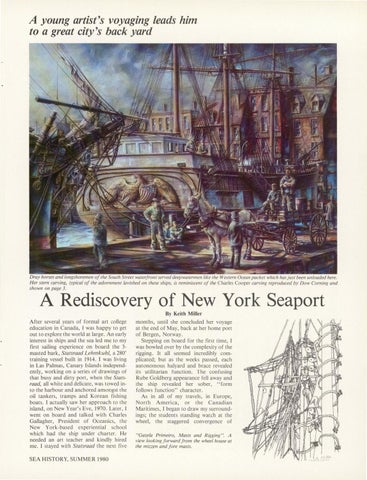A young artist's voyaging leads him to a great city's back yard
Dray horses and longshoremen of the South Street waterfront served deepwatermen like the Western Ocean packet which has just been unloaded here. Her stern carving, typical of the adornment lavished on these ships, is reminiscent of the Charles Cooper carving reproduced by Dow Corning and shown on page 3.
A Rediscovery of New York Seaport After several years of formal art college education in Canada, I was happy to get out to explore the world at large. An early interest in ships and the sea led me to my first sailing experience on board the 3masted bark, Statsraad Lehmkuhl, a 280' training vessel built in 1914. I was living in Las Palmas, Canary Island s independently, working on a series of drawings of that busy and dirty port, when the Statsraad, all white and delicate, was towed into the harbour and anchored amongst the oil tankers, tramps and Korean fishing boats. I actually saw her approach to the island, on New Year's Eve, 1970. Later, I went on board and talked with Charles Gallagher, President of Oceanics, the New York-based experiential school which had the ship under charter. He needed an art teacher and kindly hired me. I stayed with Statsraad the next five SEA HISTORY, SUMMER 1980
By Keith Miller months, until she concluded her voyage at the end of May, back at her home port of Bergen, Norway. Stepping on board for the first time, I was bowled over by the complexity of the rigging. It all seemed incredibly complicated; but as the weeks passed, each autonomous halyard and brace revealed its utilitarian function. The confusing Rube Goldberg appearance fell away and the ship revealed her sober, "form follows function" character. As in all of my travels, in Europe, North America, or the Canadian Maritimes, I began to draw my surroundings; the st udents standing watc h at the wheel, the staggered convergence of "Gaze/a Primeiro, Masts and Rigging". A view looking forward from the wheel house at the mizzen and fore masts.
